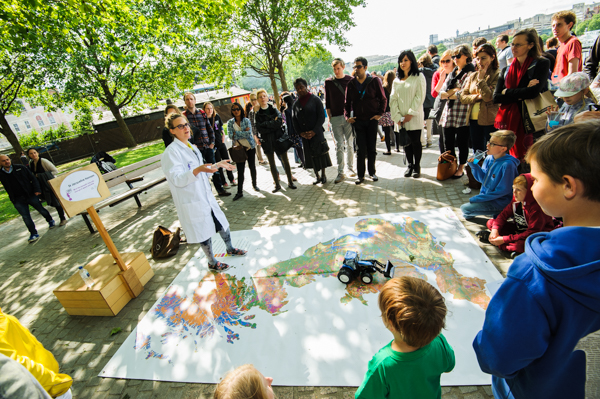The story of our soapbox: women in science
23/06/2016

A dozen female scientists will take turns to climb on a soapbox in thecentre:mk in just over a fortnight (9 July) to share their research with members of the public going about their Saturday shopping. This is the first time Soapbox Science, a nationwide grassroots initiative promoting women in science, has come to Milton Keynes. The programme includes experts in planetary auroras, food production and psychology.
Why do we need a soapbox in a shopping centre to share science? Well, women still only make up 14% of the STEM (Science, Technology, Engineering, Mathematics) workforce in the UK.
As undergraduates, women often outnumber men but there are very few female professors. Typically, only 17% of professors are women (although there is variation between disciplines). This is known as the ‘leaky pipeline’ where women progressively leave academia as the career ladder progresses to more senior positions. There are many reasons for this including unsuitable performance or promotion metrics; work-life balance; lack of mentors; lack of role models; and unconscious bias. There are a number of schemes tackling these issues, such as Athena SWAN, but we are yet to see a significant change in the diversity of the STEM workforce, both inside and outside academia.
Soapbox Science has the dual aim of promoting the visibility of women in science but also bringing science to the people, direct from the scientists. This approach means science is accessed through public spaces, not in places where it has to be sought such as science festivals or museums. Too often these places are off-putting for many people. Soapbox Science is a kind of science ambush in places where you wouldn’t expect to be stumbling across scientists – such as a shopping centre!
The event is a fantastic means of public engagement. The public get to speak to scientists directly and also see that we are just like everyone else – our job being just one facet of our lives. The all-female line-up also helps to dispel the myth that scientists are middle-aged blokes with white hair in lab coats. For the speakers, it is an unbelievably exhilarating way to share and debate their research. I participated last year and although I was initially really nervous, it was a brilliant experience. It has given me confidence in public speaking and I have become more inventive when communicating my research to different audiences.
So for one day, at least, thecentre:mk will be a centre for science – and not just a shopping centre.
Do please come along and meet the speakers on Saturday 9 July in Middleton Hall in thecentre:mk from 2-5pm. For further information, visit the Soapbox Science website and our Soapbox Science MK blog. You can follow Soapbox Science MK @SoapboxSciMK or me @Dirt_Science on Twitter.
Categories & Tags:
Leave a comment on this post:
You might also like…
From classroom to cockpit: What’s next after Cranfield
The Air Transport Management MSc isn’t just about learning theory — it’s about preparing for a career in the aviation industry. Adit shares his dream job, insights from classmates, and advice for prospective students. ...
Setting up a shared group folder in a reference manager
Many of our students are now busy working on their group projects. One easy way to share references amongst a group is to set up group folders in a reference manager like Mendeley or Zotero. ...
Company codes – CUSIP, SEDOL, ISIN…. What do they mean and how can you use them in our Library resources?
As you use our many finance resources, you will probably notice unique company identifiers which may be codes or symbols. It is worth spending some time getting to know what these are and which resources ...
Supporting careers in defence through specialist education
As a materials engineer by background, I have always been drawn to fields where technical expertise directly shapes real‑world outcomes. Few sectors exemplify this better than defence. Engineering careers in defence sit at the ...
What being a woman in STEM means to me
STEM is both a way of thinking and a practical toolkit. It sharpens reasoning and equips us to turn ideas into solutions with measurable impact. For me, STEM has never been only about acquiring ...
A woman’s experience in environmental science within defence
When I stepped into the gates of the Defence Academy it was the 30th September 2019. I did not know at the time that this would be the beginning of a long journey as ...






